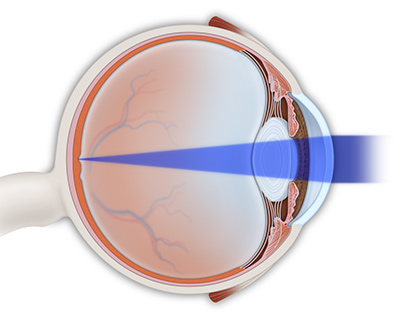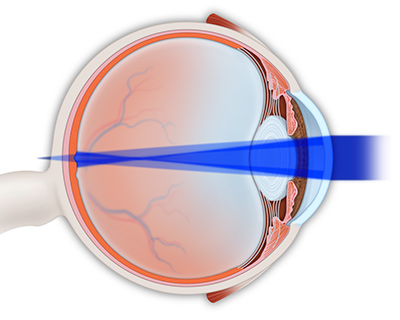What Is Refractive Error?
In the normal, healthy eye, the cornea is clear, smooth and round and the lens is clear, allowing light rays to pass through unobstructed and be focused sharply on the retina. Click HERE to watch a video on how the eye works.
However, if the cornea is not as smooth, clear or round as it should be, or the eyeball is too long or too short, light rays will bend (or refract) at odd angles, leading to blurry or distorted vision. This inability to achieve sharp focus is called refractive error, and is the most common eye problem.
Refractive errors include nearsightedness, or myopia; farsightedness, or hyperopia; or astigmatism.
Similarly, the eye will have focusing problems if the naturally clear lens is cloudy due to cataract, isn’t as flexible as it should be (causing presbyopia), or has other problems with the way it functions.
Dr. Banik can diagnose refractive error as part of your comprehensive eye examination. She will determine if you have myopia, hyperpia, or astigmatism by using a standard vision test, where you are asked to read letters on a chart placed at the other end of the room. Dr. Banik prides herself in performing careful refractions to give her patients the best quality vision possible. She often checks and double checks the measurements.
Eyeglasses or contact lenses are the most common methods of correcting refractive error symptoms. They work by refocusing light rays on the retina, compensating for the shape of your eye. They can also help protect your eyes from harmful ultraviolet (UV) light rays. A special lens coating that screens out UV light is available.
In other cases, people may choose to correct refractive error with LASIK or another similar form of refractive surgery. These surgical procedures are used to correct or improve your vision by reshaping the cornea, or front surface of your eye, effectively adjusting your eye’s focusing ability.
There is not adequate scientific evidence to suggest that eye exercises, vitamins or pills can prevent or cure refractive error.
There is no best method for correcting refractive error. The most appropriate correction for you depends on your eyes and your lifestyle. You should discuss your lifestyle with Dr. Banik to decide which correction may be most effective for you.*
*Adapted from www.aao.org

Normal eye without Refractive Error-
Image is focused perfectly on retina.

